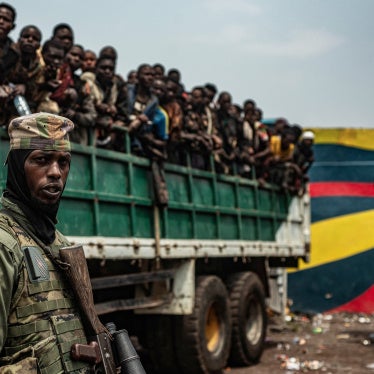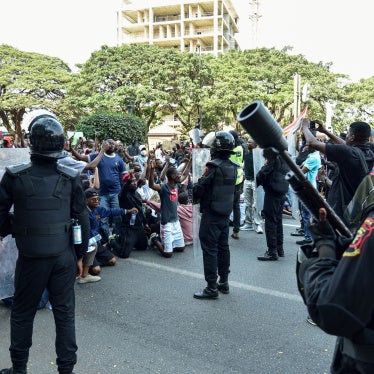Three years after the end of Angola’s brutal civil war, the Angolan government is failing to care for the country’s huge population of returning displaced persons, Human Rights Watch said in a new report released today.
Hundreds of thousands of recently returned refugees, internally displaced persons and former combatants face daunting challenges in reintegrating into Angolan society, with little government assistance. Families return to devastated communities and settle on land that is heavily mined. In some parts of the country, Angolan authorities harass, extort and sexually abuse returnees without identity cards.
The 39-page report,“Coming Home: Return and Reintegration in Angola,” documents how most families have returned to locations that still lack minimal social services, such as health care and education, let alone employment. Elderly and disabled persons, widows and female-headed households experience the worst shortfalls in government assistance, particularly in rural areas.
“After the war, there was a tremendous flood of people on the move,” said Peter Takirambudde, executive director of Human Rights Watch's Africa Division. “But even though Angolans are settling down again now, their problems are far from solved.”
The Angolan government claims it lacks the resources to help returnees. But the country is experiencing a windfall from high oil prices and the Angolan government has not adequately publicly accounted for those revenues.
Before the war ended in 2002, Angola became the first country to incorporate international standards on internal displacement into Angolan law, and extended those standards to refugees returning from abroad. The government took responsibility for creating adequate conditions of return for all returnees and assisting former UNITA (National Union for the Total Independence of Angola) combatants in the demobilization and reintegration process. But three years later, those commitments are little more than empty promises.
“The government of Angola has passed unusually good legislation to protect and assist the returnee population,” said Takirambudde. “It would be a tragedy to squander this period of hope by failing to put those words into action.”
Landmines are so pervasive in rural provinces such as Moxico that Human Rights Watch researchers witnessed children playing within yards of land marked with red flags indicating mine contamination. One mother shared her family’s tragic story: “My son lost half his leg in September. The problem is that people are hungry and they go for mangoes. Usually it is the children who go after the mangoes, but my son is twenty. The area was marked as mined but he was recently arrived and so hungry that he ignored the sign.”
At this critical moment, the United Nations is reducing its presence in Angola. Although the mandate of the United Nations High Commissioner for Refugees (UNHCR) includes monitoring refugee returns, the agency has cut its protection staffing. As a UNHCR officer told Human Rights Watch, “I am very concerned about our ability to monitor returns as we wind down the organized return phase and move into reintegration. If we don’t have the money and we’ve brought back all these people, how are we expected to help them stay?”
Funding cutbacks have forced the World Food Programme to significantly reduce its food distribution, and the UN Office for the Coordination of Humanitarian Affairs is rapidly scaling back its field presence. Angolans find themselves caught in the “emergency-to-development gap” as humanitarian assistance dries up before international development aid becomes available.
“The government of Angola cannot afford to let its people down,” Takirambudde said. “At the same time, the United Nations should not abandon Angola in this critical moment.”








